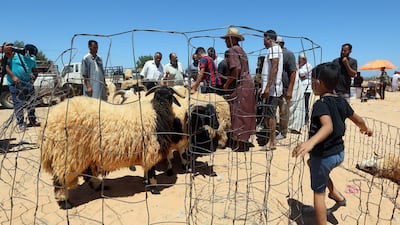Worn down by conflict, poverty and the pandemic, many Libyans are observing Eid Al Adha in a mood of gloom this year.
On the eve of the Muslim festival, the usually bustling annual sheep market on the outskirts of the capital Tripoli was largely deserted, lambs bleating in their wire-mesh pens with few customers in sight.
A handful of potential buyers eyed the sacrificial animals, their makeshift enclosures partially shaded against the blazing summer sun, in the suburb of Tajoura.
Breeder Suleiman Ertel got up long before dawn to bring his livestock from his hometown of Zliten, about 140 kilometres away, to the biggest animal market in western Libya.
The festival honours the prophet Abraham's willingness to sacrifice his son as an act of obedience to God, who then intervened and provided a sacrificial lamb instead.
The faithful commemorate this by ritually sacrificing an animal – a sheep, goat, cow or even a camel – and dividing it into three parts; for the poor, for relatives and for the home.
"Usually, in the days before the festival, people rush to buy their sheep," said Mr Ertel said, his eyes scanning the dusty three-square-kilometre expanse of the market.
But this year high livestock prices, a pandemic-driven fear of crowded markets, a financial crisis and heightened insecurity in Libya itself have all kept customers away.
For livestock farmers like him, Mr Ertel said, "everything is more expensive. Fodder has doubled in price, but also transport costs between towns, because of insecurity on some routes".
"It's discouraging," he said.
_______________
Eid Al Adha around the world

















_______________
Libya has endured almost a decade of violent chaos since the 2011 Nato-backed uprising that toppled and killed veteran dictator Muammar Qaddafi.
Tripoli, seat of the UN-recognised Government of National Accord (GNA), was besieged until several months ago by forces loyal to rival administration based in the east, and the battlefront has since moved to central Libya.
The war, involving foreign mercenary forces, fighter jets and drones provided by multiple outside actors, has taken a heavy human toll but also battered the oil-dependent economy.
The war-weary country is also plagued by water shortages and power blackouts that hobble air-conditioners and also make it impossible to store meat in freezers.
The deplorable situation is compounded by the Covid-19 crisis, which has depressed global oil prices. The virus has flared again in Libya despite curfews, the closure of schools and mosques, and a travel ban.
In recent weeks, new infections have surged above 100 a day for the first time since the virus was detected in the North African country in late March.
There have been 3,017 confirmed cases and 67 deaths in Libya from the respiratory disease, deemed by many as underestimates in a divided country with a shattered public health system.
At Tajoura's market, Ahmed Al Fallah was on the third day of his search for a sheep he could afford, in a desperate bid to try to maintain the crucial religious and family tradition.
"I ask about prices without being able to buy anything," he told AFP, keeping an eye on one of his three sons posing for a photo next to a sheep.
"I don't have enough money. I think I'm going to have to borrow some."
An average-sized sheep costs 1,200 to 1,400 Libyan dinars (Dh5,245-Dh6,120) – too much for many Libyans who, even if they have the means, cannot withdraw enough cash from their bank accounts.
"Most banks have capped withdrawals at 1,000 dinars in the days leading up to the festival," said Mohamad Kecher, another frustrated customer at the market.
"So we hesitate," he said. "Should we spend it all on the sacrificial sheep or keep the money for the family's expenses for a month?"


